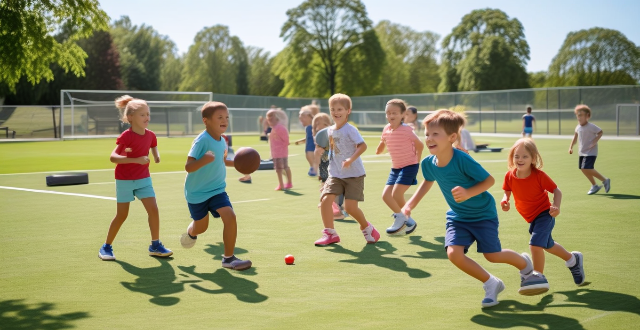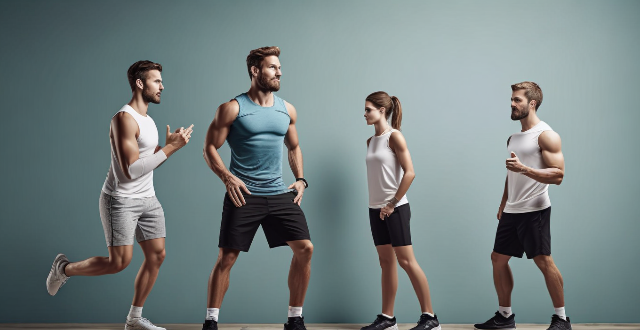Sports Pressure

Can team sports help in coping with pressure ?
Team sports can help cope with pressure by developing resilience, building confidence, providing supportive networks, and teaching time management.

How can families deal with the pressure and expectations that come with competitive sports ?
The article discusses how to manage pressure and expectations in competitive sports. It suggests setting realistic goals that focus on personal growth rather than comparing oneself to others. It also recommends encouraging a positive mindset by praising effort and improvement, emphasizing the importance of sportsmanship and fair play, teaching resilience, and modeling a positive attitude towards sports and competition. To foster a supportive environment, it suggests providing regular feedback and constructive criticism, encouraging open communication about feelings and concerns, celebrating successes, big and small, and offering emotional support during tough times. Finally, it emphasizes the importance of maintaining a balanced lifestyle that includes time for rest, relaxation, and other activities outside of sports. By implementing these strategies, families can help their athletes enjoy their sports journey while achieving personal growth and success.

What are the effects of stress and pressure on an athlete's performance, and how can sports psychology mitigate these ?
Stress and pressure can have both positive and negative effects on an athlete's performance. In small amounts, stress can increase focus and motivation, leading to improved performance. However, excessive stress and pressure can have detrimental effects on an athlete's physical and mental health, as well as their overall performance. Sports psychology is a field that focuses on using psychological techniques to improve athletic performance and enhance overall well-being. Sports psychology professionals work with athletes to develop strategies for managing stress and pressure, improving mental toughness, and enhancing overall performance.

What are the benefits and drawbacks of pursuing a career in sports psychology ?
Pursuing a career in sports psychology can have both advantages and disadvantages. Sports psychologists promote mental health awareness, reduce stigma, and enhance athletic performance through resilience and coping strategies. They also enjoy continuous learning opportunities and work with diverse clientele. However, the job market is competitive, and opportunities may be limited outside of professional sports settings. Additionally, sports psychologists often face high-pressure environments and emotional tolls from their clients' struggles. Skepticism and resistance towards their role may also exist due to lack of understanding or macho attitudes in some sports cultures.

How does peer pressure affect the mental and emotional development of adolescents ?
**Peer Pressure and Its Impact on Adolescent Development** Peer pressure significantly influences the beliefs, behaviors, and development of adolescents. Understanding its effects is crucial for promoting healthy growth. **Definition and Nature:** Peer pressure involves social and psychological influences that lead to conformity. It can be positive or negative. **Impact on Mental Health:** Constant peer influence can lead to stress, anxiety, depression, and self-esteem issues. **Effects on Emotional Development:** Adolescents may become dependent on peers, strain familial relationships, and face challenges in developing emotional intelligence. **Long-Term Implications:** Peer pressure can shape adult personality traits, career choices, and interpersonal skills. **Mitigating Negative Effects:** Parents, educators, and mental health professionals should encourage open communication, build resilience, and promote self-awareness among adolescents.

How can sports psychology help athletes manage stress and pressure during competitions ?
Sports psychology helps athletes manage stress and pressure during competitions by providing techniques and strategies to improve mental toughness, confidence, and focus. These techniques include goal setting, visualization, breathing exercises, mindfulness and meditation practices, and coping strategies such as problem-solving and emotion regulation. By implementing these tools, athletes can improve their performance and enjoy their sport more fully.

How do competitive sports impact mental health ?
Competitive sports have a significant impact on mental health, with both positive and negative effects. Positive effects include increased self-esteem and confidence, improved social skills and teamwork, stress reduction and relaxation, and goal setting and achievement. Negative effects include pressure to perform, fear of injury, burnout and overtraining, and unhealthy weight management practices. It is essential for athletes to manage the pressures associated with competition and prioritize their mental and physical health above all else. Seeking support from coaches, teammates, friends, and family members can also help athletes navigate the challenges of competitive sports and maintain good mental health.

What are the potential risks associated with children specializing in one sport too early ?
Specializing in a single sport at an early age can have both advantages and disadvantages for children. While it may lead to improved skill development and potential for higher-level competition, there are also several potential risks associated with this approach. These include physical risks such as overuse injuries, burnout, and lack of cross-training benefits; psychological risks like pressure and stress, narrowed social experiences, and fear of failure; developmental risks including delayed skill development, loss of childhood, and reduced adaptability; social risks such as isolation, peer pressure, and limited life skills; and academic risks such as time management challenges and prioritization issues. To mitigate these risks, experts often recommend encouraging diverse participation in sports until late adolescence, ensuring a balanced approach between sports, school, and leisure time, providing access to mental health resources for athletes dealing with stress and pressure, and involving parents in a supportive but not pushy way.

What is the role of peer pressure in maintaining or undermining academic integrity ?
Academic integrity is a commitment to honesty, trust, fairness, respect, and responsibility. Peer pressure can play a positive role in maintaining academic integrity by encouraging ethical behavior, promoting collaborative learning, and providing support and encouragement for students. However, peer pressure can also undermine academic integrity by promoting cheating and plagiarism, disrupting collaborative learning environments, and stigmatizing help-seeking behavior. It is essential to recognize the potential impact of peer pressure on academic integrity and work to foster an environment that supports ethical behavior and discourages cheating and plagiarism.

How do climate models account for factors such as ocean currents, atmospheric pressure, and solar radiation ?
Climate models are complex mathematical representations of the Earth's climate system, designed to simulate and understand the behavior of various components such as ocean currents, atmospheric pressure, and solar radiation. These factors play a crucial role in shaping our planet's climate, and their interactions are essential for accurate climate predictions. Ocean currents act as conveyor belts for heat, moving it from the equator towards the poles and helping to regulate global temperatures. Climate models use fluid dynamics equations to simulate the movement of water in the oceans, and observations from satellites and buoys are integrated into models to improve the accuracy of ocean current simulations. Atmospheric pressure influences weather patterns and is a key driver of wind systems around the globe. Numerical Weather Prediction (NWP) Models solve the Navier-Stokes equations to simulate atmospheric pressure changes over time, while Global Climate Models (GCMs) incorporate principles of thermodynamics and fluid dynamics to predict how pressure variations will impact climate. Solar radiation provides the primary energy source that drives Earth's climate system. Radiative Transfer Models (RTMs) calculate how solar radiation interacts with the atmosphere and Earth's surface, while Spectral Irradiance Models estimate the amount of solar energy reaching Earth based on sunspot activity and other solar cycles. Coupled Models combine RTMs with atmospheric and oceanic models to understand the full impact of solar radiation on climate.

How does the pressure of expectations from fans, media, and sponsors influence an athlete's performance at a competitive level ?
The text discusses the influence of expectations from fans, media, and sponsors on athlete performance. It outlines both positive and negative impacts of these expectations. Fan expectations can motivate athletes and boost their confidence but can also cause anxiety and distractions. Media expectations increase publicity and accountability but may lead to overwhelming pressure and misrepresentation. Sponsor expectations provide financial support and brand alignment opportunities but can result in contractual pressures and distractions. Overall, managing these external pressures effectively is crucial for athletes to maintain optimal performance levels.

How do sports competitions influence stress levels and mental readiness ?
Sports competitions can significantly impact stress levels and mental readiness. Performance pressure, fear of failure, winning obsession, and physical exertion can increase stress levels, while confidence building, goal achievement, camaraderie, and mindfulness practices can decrease them. Similarly, focus and concentration, resilience, mental toughness, and visualization techniques can improve mental readiness, while overthinking, perfectionism, lack of self-belief, and external factors can impair it. Overall, sports competitions provide opportunities for growth, learning, and personal development but also present challenges that require effective coping strategies to manage stress levels and maintain mental readiness.

Is there a correlation between sports participation and academic performance ?
The article explores the correlation between sports participation and academic performance. It highlights the potential benefits, such as improved time management skills, increased motivation and discipline, and enhanced social skills, but also acknowledges the potential drawbacks, including time constraints, fatigue, pressure, and stress. The conclusion emphasizes the importance of finding a balance between sports commitments and academic responsibilities for optimal performance in both areas.

What are the benefits of having a strong sports mentality ?
A strong sports mentality can bring numerous benefits to an individual, both on and off the field. A sports mentality refers to a set of psychological traits and attitudes that enable athletes to perform at their best under pressure, maintain focus, and overcome challenges. Having a strong sports mentality can significantly improve an athlete's performance by enhancing their ability to concentrate, make quick decisions, and execute skills effectively. This mental toughness allows them to stay calm under pressure and maintain a positive mindset even when facing adversity. As a result, they are more likely to achieve success in their chosen sport. Athletes with a strong sports mentality tend to be more resilient in the face of setbacks and failures. They view these challenges as opportunities for growth and learning rather than obstacles that prevent them from achieving their goals. This resilience helps them bounce back from disappointments and continue working towards their objectives. A strong sports mentality also provides athletes with effective coping mechanisms for dealing with stress and anxiety. These strategies may include visualization techniques, deep breathing exercises, or positive self-talk. By employing these methods, athletes can manage their emotions and maintain a level head during high-pressure situations. Individuals with a strong sports mentality are often highly motivated and driven to succeed. They possess a strong desire to improve and push themselves to reach new heights. This intrinsic motivation can lead to increased effort and dedication, which ultimately translates into better results. A sports mentality fosters teamwork and collaboration among athletes. It encourages individuals to work together towards a common goal, support each other through challenges, and celebrate collective achievements. This sense of camaraderie not only improves performance but also creates lasting bonds between teammates. Finally, having a strong sports mentality promotes personal growth and development. Athletes learn valuable life skills such as discipline, perseverance, time management, and goal setting. These skills are transferable to other areas of life, helping individuals become well-rounded individuals who are capable of achieving success in various endeavors.

How can mental toughness be developed in athletes through sports psychology ?
The article discusses the importance of mental toughness in sports and how sports psychology can help athletes develop this quality. It outlines six ways that sports psychologists can assist athletes in developing mental toughness, including goal setting, self-talk, visualization techniques, stress management, mindfulness practices, and team building activities. These strategies can enhance resilience, focus, and motivation in athletes, leading to success in their chosen sport.

What is sports psychology and how does it benefit athletes ?
Sports psychology is a specialized branch of psychology that focuses on the psychological and mental aspects of sports and physical activity. It involves the study of how an athlete's thoughts, emotions, attitudes, and behaviors affect their performance in sports or exercise. Sports psychologists work with athletes to enhance their mental skills, improve their performance, and cope with stress and pressure. Benefits include improved performance, enhanced motivation, emotional regulation, team cohesion, injury recovery, and career longevity.

Can watching sports movies improve your athletic performance ?
**Can Watching Sports Movies Improve Your Athletic Performance?** *Watching sports movies can provide motivation, teach techniques, and emphasize the importance of sportsmanship and teamwork. While they won't directly enhance performance, they can inspire consistent practice and hard work.*

What role do sports play in character building for children ?
The article discusses the various ways in which sports contribute to the overall personality development of children. Sports ensure physical health and well-being, teach valuable life skills such as teamwork, leadership, communication, and goal setting, impact emotional development by boosting self-esteem, teaching resilience, and handling pressure, provide opportunities for socialization, and play a crucial role in moral development by instilling values such as integrity, respect, and responsibility. The author concludes that sports are not just about physical fitness but are powerful tools for character building in children.

How does participating in sports affect family relationships ?
The impact of sports participation on family relationships can be both positive and negative. Positive effects include enhanced communication, shared experiences, teaching responsibility, and promoting healthy habits. Negative effects may arise from time constraints, pressure and stress, and financial strain. To manage these challenges, families should set realistic expectations, make time for family activities, communicate openly, and manage finances wisely.

What is the impact of sports on the career aspirations of young people ?
Text: The Impact of Sports on the Career Aspirations of Young People Introduction - Sports are integral to society and significantly impact young people's career aspirations. - This article explores both positive and negative aspects of sports' influence on career goals. Positive Impact 1. Development of Key Skills - Teamwork, leadership, perseverance, and other skills developed through sports are beneficial in any career. 2. Increased Confidence and Self-Esteem - Success in sports can boost confidence and self-esteem, making young people more likely to pursue ambitious career goals. 3. Exposure to Diverse Opportunities - Sports open doors to various career paths and scholarships for higher education. Negative Impact 1. Pressure and Burnout - Intense focus on sports achievements can lead to excessive pressure and burnout. 2. Limited Time for Other Activities - Dedication to sports training may leave little time for exploring other interests or developing skills outside of sports. 3. Injury Risks - The risk of injury is always present in sports and can hinder a young person's ability to pursue a sports-related career or affect overall employability. Conclusion - Sports have a profound impact on the career aspirations of young people. - While they offer numerous benefits, it is essential to be aware of potential drawbacks. - Balancing sports involvement with other activities and interests allows young individuals to make informed decisions about their future career paths while enjoying the benefits of sports.

How can athletes maintain emotional balance during high-pressure competitions ?
Athletes can maintain emotional balance during high-pressure competitions by practicing mindfulness and meditation, visualization and imagery, goal setting and positive self-talk, physical preparation and recovery, social support, and seeking professional help when needed.

How does being involved in sports impact sibling relationships ?
Being involved in sports can have both positive and negative impacts on sibling relationships. Here are some ways in which sports can affect the dynamics between siblings: ### Positive Impacts: - **Teamwork**: Playing sports together can teach siblings how to work as a team, communicate effectively, and support each other. This can strengthen their bond and improve their overall relationship. - **Shared Interests**: Sports can provide a common interest for siblings, allowing them to spend time together and create shared memories. This can help build a stronger connection between them. - **Respect for Abilities**: When siblings participate in sports, they may develop respect for each other's abilities and accomplishments. This can lead to increased admiration and understanding between them. - **Goal Oriented**: Sports can teach siblings about setting and achieving goals, which can be applied to other areas of their lives. This can help them grow together and encourage each other to succeed. ### Negative Impacts: - **Competition**: While healthy competition can be beneficial, it can also lead to jealousy and resentment if one sibling feels that the other is receiving more attention or praise. This can strain their relationship and cause tension within the family. - **Pressure**: The pressure to perform well in sports can sometimes create stress and anxiety for siblings. This can lead to conflicts and disagreements, especially if one sibling feels that the other is not contributing enough effort. - **Time Management**: Sports commitments can take up a significant amount of time, leaving less opportunity for siblings to spend time together outside of their athletic pursuits. This can lead to feelings of isolation and neglect within the relationship. - **Injuries**: Injuries sustained during sports can have long-term effects on a sibling's ability to participate in activities with their siblings. This can cause frustration and disappointment, potentially damaging the bond between them. In conclusion, being involved in sports can have both positive and negative impacts on sibling relationships. It is essential for parents and coaches to encourage healthy competition, communication, and teamwork while also ensuring that siblings have ample opportunities to spend quality time together outside of their athletic pursuits. By doing so, sports can serve as a valuable tool for strengthening sibling bonds and fostering lifelong friendships.

What are the psychological benefits of participating in sports ?
Participating in sports can have numerous psychological benefits that extend beyond physical health. Here are some of the key advantages: - **Improved Mood and Reduced Stress**: Boosts endorphins, decreases cortisol levels, and helps to lower stress. - **Enhanced Self-Esteem and Confidence**: Achievement and mastery in sports boost self-esteem, while social interaction increases confidence. - **Better Sleep Quality**: Regular exercise leads to physical fatigue and relaxation, improving sleep patterns. - **Increased Resilience and Mental Toughness**: Overcoming adversity in sports builds resilience, while goal-oriented pursuits foster mental toughness. - **Social Support and Connection**: Teamwork and camaraderie provide a network of support, while shared experiences create bonds and friendships. - **Improved Cognitive Function**: Studies suggest regular exercise can lead to increased brain volume and improved cognitive function. - **Emotional Regulation and Coping Mechanisms**: Sports provide an outlet for expressing and managing emotions like anger or frustration, and athletes learn to cope with high-pressure situations. - **Positive Addiction and Avoidance of Unhealthy Habits**: Sports can become a positive addiction, replacing less healthy habits, and require time management, reducing idle time that could lead to unhealthy behaviors.

How can sports help individuals develop leadership skills and personal growth ?
Participating in sports can help individuals develop leadership skills and foster personal growth by enhancing goal-setting, teamwork, resilience, decision-making under pressure, accountability, confidence building, discipline, physical health, emotional intelligence, and social interaction.

Can excessive sports participation harm a child's physical development ?
Overtraining in sports can lead to physical injuries, psychological stress, and hindered social interaction in children. It is important to ensure a balanced approach to sports participation, emphasizing rest, proper training techniques, and mental health support.

Can sports events promote peace between nations ?
Sports events can promote peace between nations by breaking down barriers, fostering cultural exchange, and providing a platform for diplomatic engagement. Historical and modern-day examples show the potential of sports diplomacy, but challenges such as political interference and commercialization must be considered. Overall, sports have the power to bring people together and promote understanding, making them a valuable tool for promoting peace.

How has technology influenced the design of sports fashion ?
Technology has significantly influenced sports fashion design, introducing advanced materials, digital printing techniques, smart wearables, and increased customization options. These innovations have enhanced the functionality, comfort, and style of sports apparel, catering to individual preferences and needs.

What is sports psychology and how does it impact athletic performance ?
Sports psychology is a specialized branch of psychology that focuses on how psychological factors influence athletic performance. It encompasses the study of athletes' motivation, mental preparation, concentration, confidence, team dynamics, and the psychological aspects of injury and recovery. By understanding these elements, sports psychologists help athletes enhance their performance, cope with stress, and achieve peak mental states for competition. The key areas of sports psychology include motivation, mental preparation, concentration, confidence, team dynamics, and injury and recovery. Motivation involves intrinsic and extrinsic motivation, as well as goal setting to improve focus and commitment. Mental preparation includes visualization and imagery, self-talk, and flow state. Concentration involves focus management and ignoring distractions. Confidence includes self-efficacy and mental toughness. Team dynamics involve group cohesion and role acceptance. Injury and recovery involve coping strategies for dealing with the emotional impact of injuries and maintaining motivation and positive mindset during rehabilitation. The impact of sports psychology on athletic performance is multifaceted, including enhanced performance through improved focus and increased resilience, mental health benefits such as stress reduction and boosted self-esteem, and team synergy through better communication and coping with pressure. Overall, integrating sports psychology into training regimes can help athletes cultivate the mental fortitude needed to reach their full potential and enjoy a healthier sporting lifestyle.

What are the long-term effects of youth sports on mental health ?
Youth sports can have both positive and negative effects on mental health, including increased self-esteem, improved social skills, and reduced stress levels. However, pressure to perform, overtraining, injuries, bullying, and dependence on sports for identity can also have negative impacts. It is important for adults involved in youth sports to be aware of these potential effects and take steps to foster the positive ones while mitigating any negative impacts.